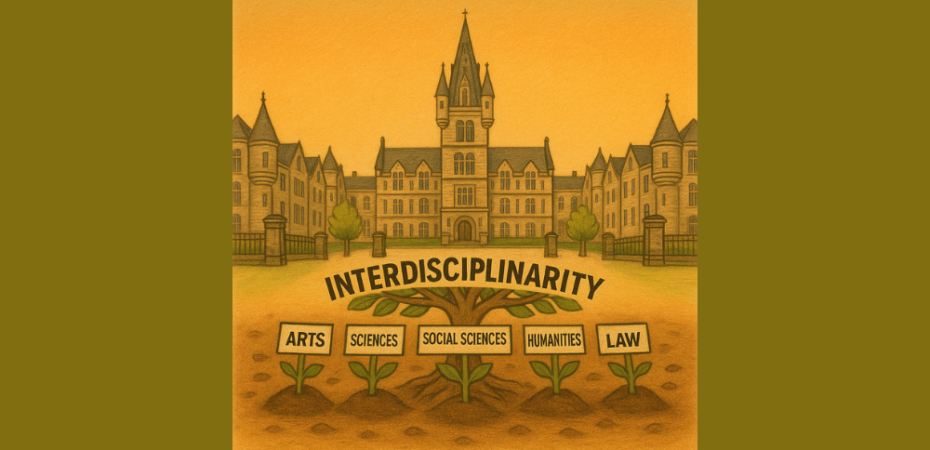
Welcome to the July’s Hot Topic: Navigating complexity through interdisciplinary learning and teaching
Universities today stand at a crossroads; they are caught between tradition and transformation. As we confront rapid societal shifts, technological advancements, and increasingly complex global challenges, how can higher education evolve to remain relevant, impactful, and empowering for students?
This month’s Hot Topic series is co-edited by Anthony Skerik, a student in the inaugural cohort of the MA Interdisciplinary Futures programme at the University of Edinburgh. Anthony proposed this series to spotlight the lived experience of students and staff engaging with interdisciplinary education—and to challenge common assumptions about what a university degree should look like in today’s fast-changing world. With a strong interest in curriculum innovation and higher education reform, Anthony brings a unique insider-outsider perspective to the conversation.
The traditional model of university education is structured around tightly defined disciplinary boundaries. However, this modality of teaching is facing pressures as graduates are increasingly encountering gaps in their skill sets, as job markets demand capabilities beyond deep subject expertise. Employers today seek professionals who are not only specialists but who can navigate complex, cross-sectoral challenges with agility and creativity. Addressing urgent global issues like climate change, public health crises, and social inequalities requires graduates capable of integrating insights across multiple disciplines – an ability sometimes missing in traditionally educated students.
Interdisciplinary education fills this critical niche, integrating methods, theories, and insights from various disciplines to cultivate comprehensive understanding and innovative problem-solving capabilities. Imagine disciplines as fruits: traditional education arranges these fruits neatly in a bowl—distinct and isolated. In contrast, interdisciplinarity blends them into a smoothie, creating something cohesive, nourishing, and fundamentally new.
Leading this transformative educational movement is the Edinburgh Futures Institute (EFI), home to the pioneering undergraduate Interdisciplinary Futures programme. This innovative approach uses collaborative, problem-based learning to equip students with diverse knowledge and the vital cognitive agility, creative thinking, and collaborative competencies that traditional education systems typically overlook but which are essential for navigating an uncertain future.
This blog series will explore key questions, challenges, and opportunities facing interdisciplinary education today. Core to the series is a five-part blog post featuring a conversation between Anthony Skerik and Professor Sabine Rolle, one of the architects and leaders of the Interdisciplinary Futures programme, which explores critical themes and institutional insights. The conversation will be interwoven by the following pieces written by various Interdisciplinary Futures students and University staff:
- Interdisciplinary Journeys: Students Share Their Experiences – Meri Suonenlahti, Zoe Jones, and Ruth Raffle
- Reflecting on the Manifesto: A Student’s View on Interdisciplinary Learning – David McGregor
- Navigating Collaborative Challenges in Interdisciplinary Teams – Samantha Banner
- Thriving in Complexity: How Interdisciplinary Education Equips Students for a Changing World – Gavin McCabe
- Researching Interdisciplinary Learning and Teaching in Practice – Jenny Scoles
Throughout the series, we will delve into the following topics:
- What interdisciplinarity truly means and why it matters;
- How students from diverse backgrounds adapt to interdisciplinary learning;
- Addressing skepticism and challenging academic norms around interdisciplinary degrees;
- The employability of interdisciplinary graduates and the essential skills they develop;
- Institutional changes required to sustain and advance interdisciplinary education;
- The future of interdisciplinarity.
Whether you’re a student curious about non-traditional academic pathways, an educator interested in innovative curriculum design, or a policymaker looking to understand the future landscape of higher education, this series promises valuable insights and thoughtful perspectives.
We invite you to join us in reimagining what university education can—and should—become. Let’s Navigate Complexity together.
 Anthony Skerik
Anthony Skerik
Anthony Skerik is a student at the University of Edinburgh and a member of the inaugural Interdisciplinary Futures class of 2027. His work explores how interdisciplinary thinking can be applied to real-world challenges, with a particular interest in conflict, innovation, and co-creation. He has held multiple positions within the University’s Information Services Group (ISG), supporting projects that bridge technology, communication, and education. As a co-editor of the Navigating Complexity: Preparing for the Future through Interdisciplinary Education blog series, he is committed to highlighting student perspectives and documenting the evolving landscape of interdisciplinary learning.


